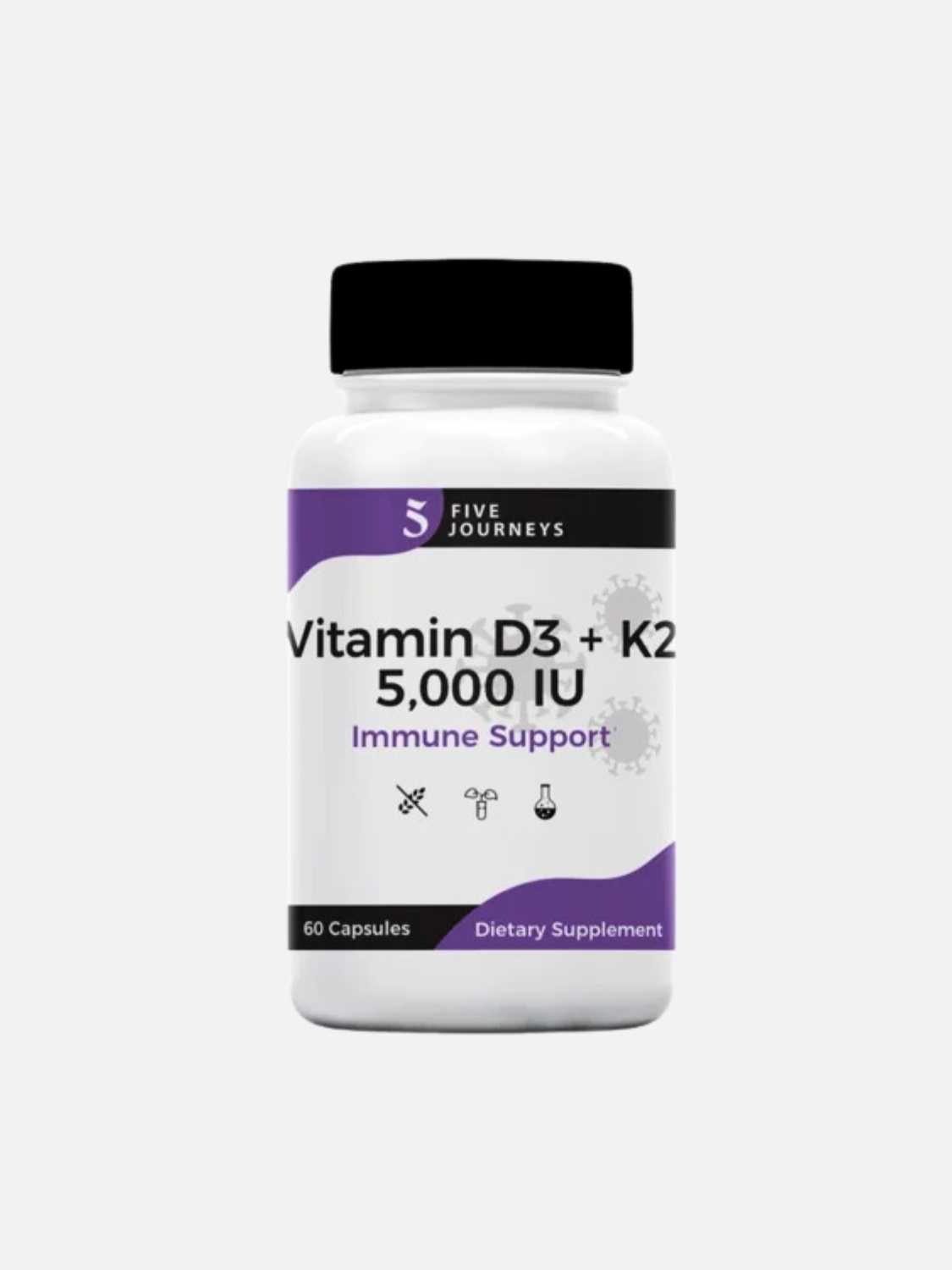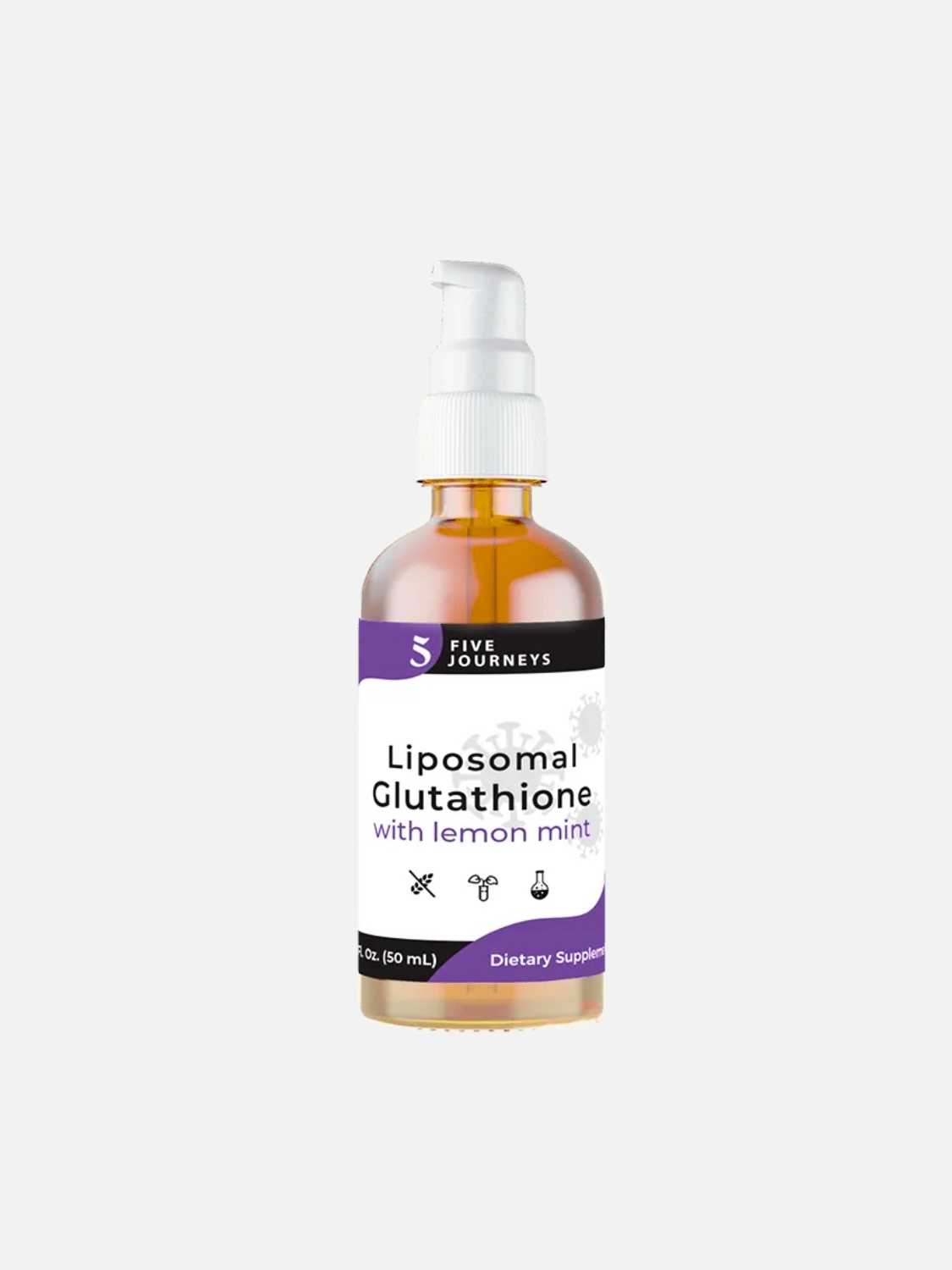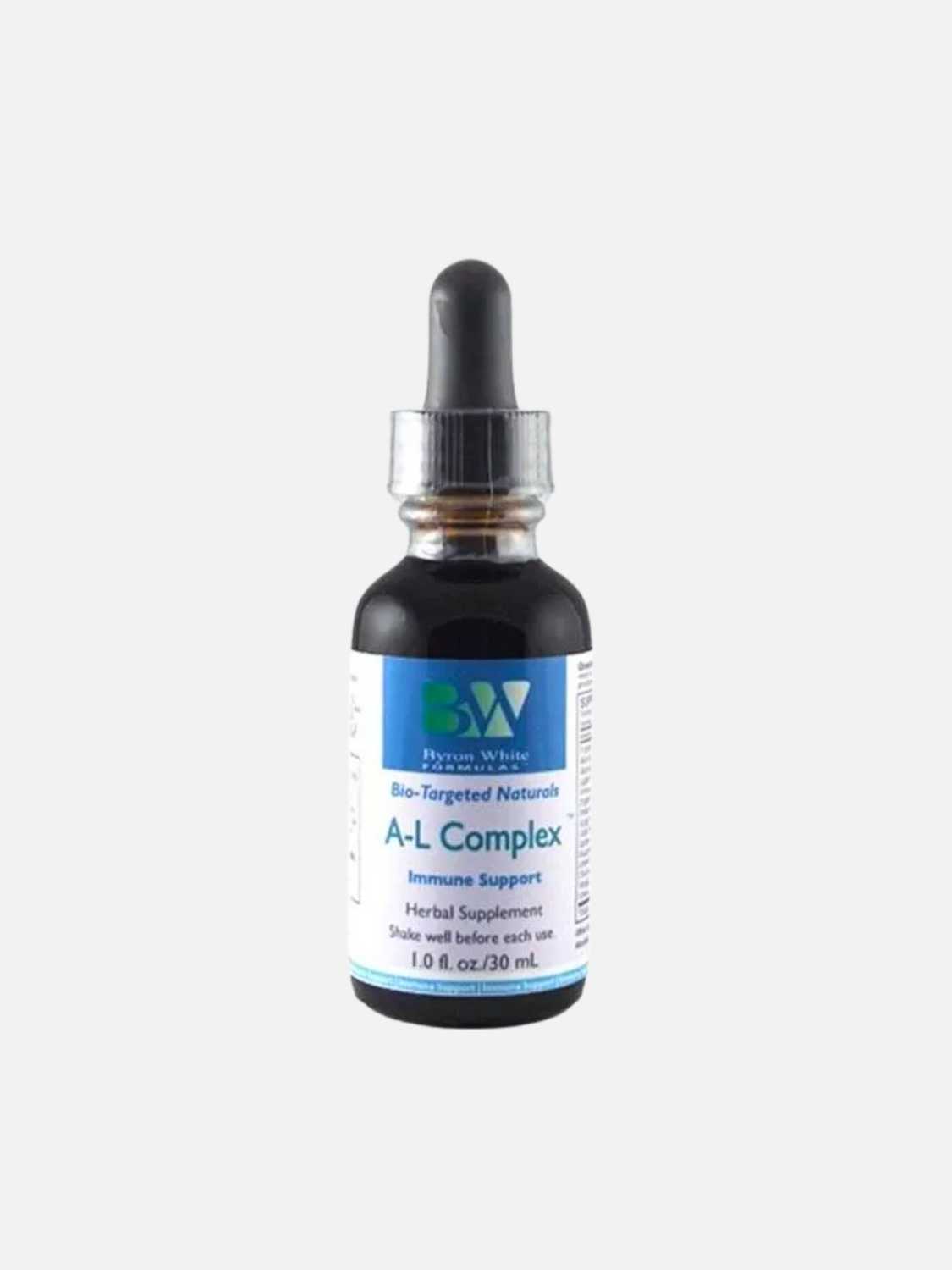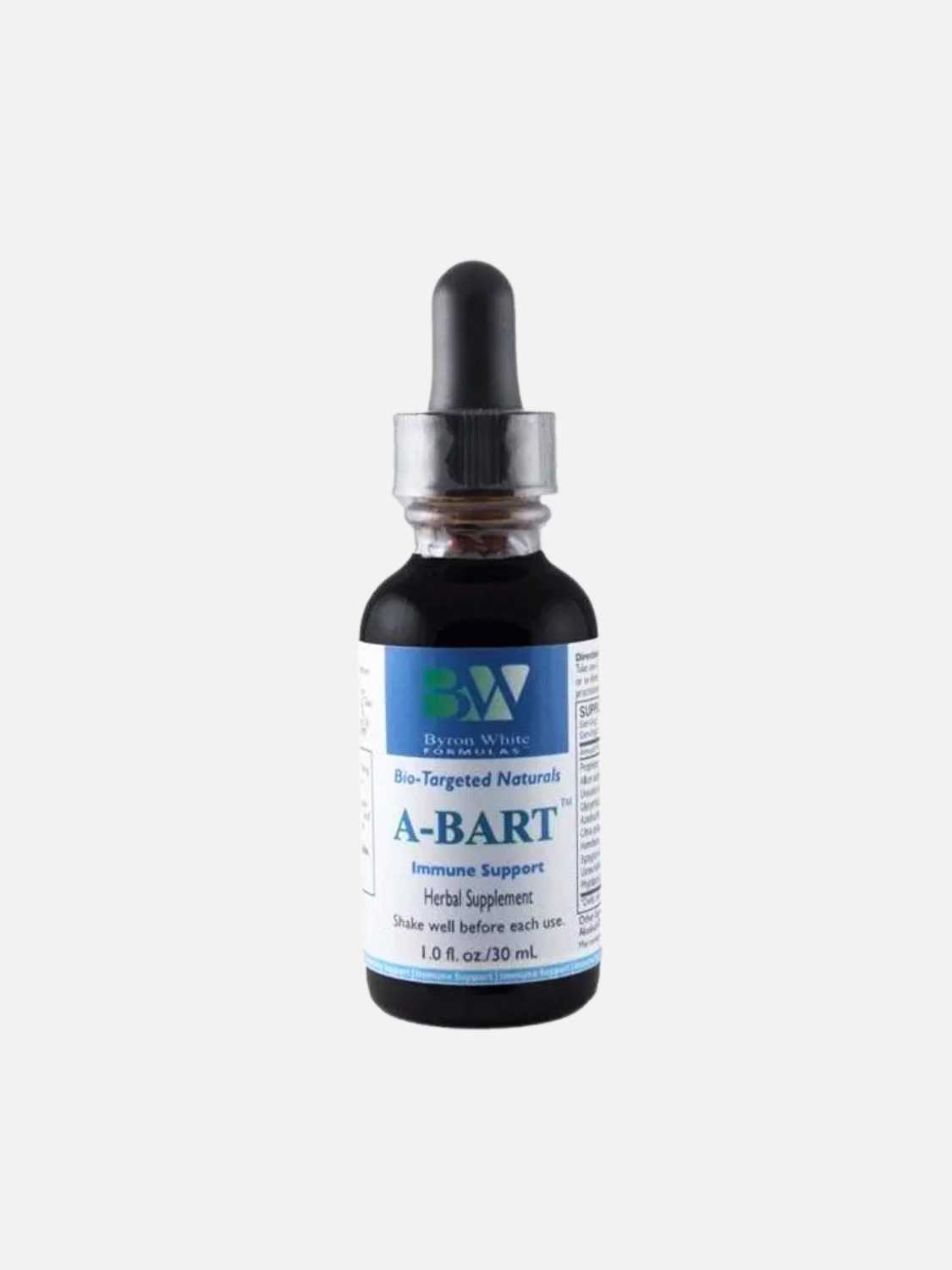Supplements for Immune System
Your immune system is your body’s first line of defense, a complex and intelligent network that works tirelessly to keep you healthy. Since we face a constant barrage of germs and environmental stressors, giving your immune system the right support is a critical way to ensure your longevity.
Immune support supplements offer a proven way to give your body the targeted nutrients and botanicals it needs to stay resilient and balanced. They are made to help you stay strong and healthy so you can live a vibrant life until you’re 100 years old.

Key Takeaways
- The goal of immune support is not to “boost” your immune system, which can be dangerous, but to optimize and balance it so it is smart and responsive.
- Foundational immune health is built on a healthy lifestyle, including a balanced diet, regular exercise, adequate sleep, and stress management. Supplements play a supportive role in addressing deficiencies.
- Many key nutrients are recognized for their roles in immune function, including Vitamin D3, Vitamin K2, Zinc, Vitamin C, and Magnesium.
- A healthy gut microbiome is a foundation for a strong immune system, supported by probiotics, prebiotics, and fermented foods.
- Herbal and botanical supplements can also support immune function, with examples like Olive Leaf, Garlic, Black Seed Oil, and various Medicinal Mushrooms (Turkey Tail, Reishi, Cordyceps).
- For optimal results, it is important to consult a healthcare professional to assess individual needs and choose the right supplements, as dosages and interactions can vary.
- Five Journeys provides practitioner-curated, clean, and clinically-effective formulas, grounded in a holistic approach to immune health.
Bundle and Save!
Immune Support Bundle
Fortify your body’s defenses and prepare for cold and flu season with this expertly curated immune support bundle.
Bundle and save!
Save $20.52.
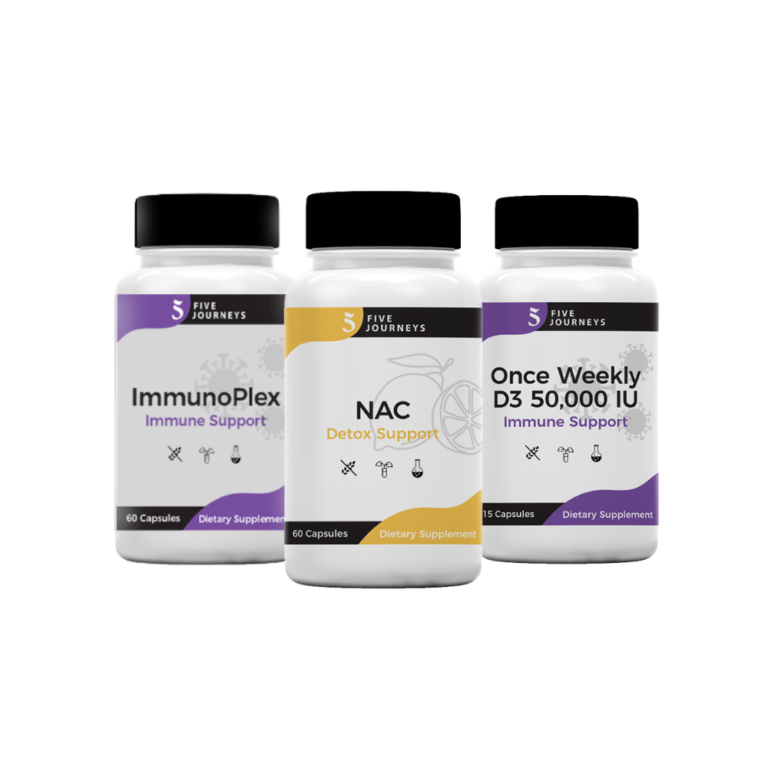
What Are Immune Support Supplements?
Immune support supplements are a powerful blend of specific vitamins, minerals, and herbal extracts designed to help your body’s defenses. A common mistake is thinking these supplements will “supercharge” your system; instead, they help your immune system function optimally.
These supplements provide the foundational building blocks and compounds that your immune system relies on for a smart, balanced response. Think of it as giving your body the right tools to do its crucial job, helping you stay healthy and resilient.
How Immune Supplements Support Your Health
Your immune system is a powerful and dynamic network that requires a steady supply of nutrients to function effectively. Supplements for your immune system work by filling in any nutritional gaps and providing targeted support to your body’s natural defenses. This can help to fortify your system and promote resilience against a never-ending list of challenges.
Boosting vs. Optimizing
A common mistake is thinking you need to “boost” your immune system. The goal isn’t a stronger immune response, which can be dangerous and lead to problems like autoimmune disorders. Instead, the focus should be on optimizing and balancing your immune system so it is smart, responsive, and able to tell the difference between a real threat and a false alarm. That’s the true sign of a healthy immune response.
Immunologists emphasize that a well-regulated immune system is the key to true health. An overactive immune response can cause excessive inflammation and tissue damage, while an insufficient one leaves the body vulnerable to infections. This is why foundational immune health is built on lifestyle factors like a healthy diet, regular exercise, adequate sleep, and effective stress management. Supplements play a supportive role, helping to address deficiencies rather than acting as a simple “quick fix” or “miracle drug.”
Your immune system is a sophisticated network of cells, organs, and proteins that work tirelessly to protect your body. Its main functions include identifying and destroying invaders, limiting harm, and adapting to new threats. This powerful system requires precise regulation to function optimally. By focusing on balance and providing your body with the right support, you can empower your immune system to do its crucial job effectively and keep you healthy.
Key Benefits of Immune Supplements
Enhance Your Body’s Natural Defenses
Strengthen Everyday Resilience
Reduce the Duration and Severity of Illness
Provide Antioxidant and Cellular Protection
Support Respiratory and Sinus Health
Top Immune Boosting Supplements We Trust
Core Micronutrients
Certain micronutrients are recognized as fundamental for immune system function, acting as essential building blocks. Addressing deficiencies in these areas can significantly improve immune competence.
Vitamin D3
Vitamin D, specifically its active form, functions as a steroid hormone with profound effects on your immune system. Its receptors are found on various immune cells, including B cells, T cells, and macrophages. This allows vitamin D to act locally within your body, modulating both your innate and adaptive immune responses. A significant body of evidence links vitamin D deficiency to increased susceptibility to infections. Mechanistically, vitamin D enhances innate antimicrobial responses and influences adaptive immunity. This dual role in both innate and adaptive immunity underscores its critical importance beyond just bone health.
Olive Leaf Capsules
Olive leaf extract (OLE) contains oleuropein, a powerful antioxidant with anti-inflammatory, antimicrobial, and immunomodulatory effects. OLE supports immune function by reducing oxidative stress and promoting a balanced immune response. In addition to its anti-inflammatory properties, it can directly target pathogens like bacteria, viruses, fungi, and parasites. In studies, OLE has been shown to activate T helper cells and enhance the production of interferon (IFN)-γ, which may reinforce anti-tumor activity.
Probiotics, Prebiotics, and Fermented Foods
A healthy gut microbiome is the foundation of a strong immune system. We prioritize probiotics with strains that are specifically researched for their ability to support immune function. Incorporating fermented foods and fiber-rich prebiotics from sources like garlic and oats supports a diverse and balanced gut microbiome, which is crucial for immune regulation and managing inflammation.
Vitamin K2
Vitamin K2 plays a crucial synergistic role with Vitamin D3, particularly in calcium metabolism, which indirectly supports overall systemic health and, by extension, immune resilience. While Vitamin D3 enhances the absorption of calcium from the digestive tract, Vitamin K2 is essential for directing this absorbed calcium to its proper destinations, primarily bones and teeth. This function prevents its harmful deposition in soft tissues like arteries and kidneys. This systemic benefit of preventing inappropriate calcification and supporting cardiovascular health contributes to a healthier overall physiological environment, indirectly supporting immune function by reducing chronic inflammation and improving cellular health. For optimal absorption and effectiveness, Vitamin D3 and K2 supplements should be taken with a meal containing healthy fats.
Zinc
Zinc is an indispensable micronutrient found throughout the body, playing a vital role in over 300 enzymatic reactions. It is crucial for the proper functioning of the immune system, metabolism, and wound healing. Deficiency in zinc is strongly associated with increased susceptibility to infections. Research indicates that zinc supplements can shorten the duration of the common cold if taken within 24 hours of symptom onset. A critical aspect of zinc supplementation is its intricate relationship with copper. An imbalance in one can directly affect the other, and excess zinc can impair immune function by inhibiting copper-dependent enzymes. Maintaining a proper zinc/copper ratio is essential for overall wellness.
Vitamin C
Vitamin C is an essential micronutrient with potent antioxidant properties and a significant role in immune defense. It supports the integrity of epithelial barriers, which act as the body’s first line of defense against pathogens. It also enhances the function of immune cells and is necessary for the clearance of spent neutrophils from infection sites. Deficiency leads to impaired immunity and a higher susceptibility to infections. For established infections, significantly higher doses may be required. It’s important to note that a balanced diet providing adequate vitamin C positively affects the immune system, but available data generally do not support the theory that high-dose oral vitamin C supplements significantly decrease the risk of respiratory infections in a well-nourished general population.
Liposomal Vitamin C
Liposomal vitamin C is a newer formulation that has gained attention for its potentially enhanced bioavailability and effectiveness compared to traditional ascorbic acid. Vitamin C is water-soluble, and its absorption is limited, with excess quickly excreted. Liposomal encapsulation involves enclosing vitamin C within phospholipid membranes, which protects it from degradation in the digestive tract and facilitates its absorption and cellular uptake. Clinical studies have demonstrated that this leads to significantly higher blood plasma levels of vitamin C.
Magnesium
Magnesium is an undeniable powerhouse mineral, acting as a cofactor in over 600 enzymatic reactions. It plays a pivotal and essential role in optimal immune function and the regulation of inflammation. It is crucial for the activation of T cells, which are critical for combating cancer cells and infectious agents. Magnesium is also critically important as a cofactor for the enzymes responsible for metabolizing and activating Vitamin D into its usable form. This interconnectedness highlights magnesium’s foundational importance for both individual physiological processes and the synergistic function of other vital nutrients in maintaining overall health and immune resilience.
N-acetylcysteine (NAC)
NAC is primarily valued for its role as a precursor to glutathione, one of the body’s most powerful antioxidants. It helps neutralize free radicals that can damage cells and tissues, thereby supporting the body’s natural immune system. In the respiratory system, NAC acts as both an antioxidant and an expectorant, loosening mucus in air passageways. It also helps replenish glutathione levels in the lungs and reduces inflammation. Test-tube studies suggest NAC may inhibit the flu virus from replicating, and a six-month study indicated fewer flu symptoms in individuals taking NAC.
Garlic
Garlic has a long history of traditional use for health benefits. Its compounds are attributed with antioxidant, anti-inflammatory, and antimicrobial capacities. Garlic can maintain immune system homeostasis by positively affecting immune cells. Its anti-inflammatory activity involves reducing the production of pro-inflammatory mediators. Garlic extracts have demonstrated broad-spectrum antimicrobial effects against various bacteria, fungi, and viruses.
Medicinal Mushrooms
Medicinal mushrooms have been used for centuries in traditional medicine systems. They contain various bioactive compounds, including polysaccharides (like beta-glucans), triterpenes, and other phytochemicals, which are believed to interact with immune cells.
Turkey Tail (Trametes versicolor)
This mushroom contains PSP and PSK, which have been studied for their immunomodulatory and potential anti-cancer effects. PSK and PSP are considered prebiotics, capable of modulating the gut microbiome, which is intrinsically linked to immune health.
Reishi (Ganoderma lucidum)
A mainstay of traditional Chinese medicine, Reishi is reputed for its anti-inflammatory, antioxidant, and immune-stabilizing properties. Test-tube studies indicate Reishi can affect genes in white blood cells and alter inflammation pathways, potentially managing the function of T lymphocyte cells.
Cordyceps (Cordyceps militaris)
This fungus is believed to improve immunity by stimulating immune cells and specific chemicals. In test-tube and animal studies, Cordyceps has shown potential to inhibit the growth of various cancer cells and exert anti-inflammatory effects. It is important to note that Cordyceps might cause the immune system to become more active, which could increase symptoms of autoimmune diseases.
Black Seed Oil (Nigella sativa)
Black seed oil has a long history of traditional use as both food and medicine. Scientific investigations suggest that it may possess effects that help modulate the immune system, fight cancer, and reduce swelling. Its active constituent, thymoquinone (TQ), and other components have demonstrated anti-inflammatory, antioxidant, and antimicrobial properties. Evidence indicates that taking black seed oil daily may improve allergy symptoms in people with hay fever. It is generally considered possibly safe for up to 3 months in larger amounts, but can cause allergic rashes in some individuals and may interact with immunosuppressants.
Quercetin
Quercetin is a natural flavonoid compound widely found in vegetables, fruits, and nuts. It is known for its potent antioxidant, anti-inflammatory, and immunomodulatory properties. In vitro and animal models have shown that quercetin can inhibit oxidative stress and reduce inflammatory cytokine levels. Its immunomodulatory effects include enhancing the activity of immune cells such as T cells and natural killer (NK) cells. A significant challenge for quercetin’s clinical application is its low bioavailability. The overall evidence for quercetin acting as a direct “immune booster” in humans still requires further verification for broad application.
Polyphenols
These powerful plant compounds act as antioxidants, anti-inflammatories, and prebiotics. They nurture the beneficial bacteria in your gut, contributing to your overall health and well-being.
Clinically-Formulated Supplements for Results
Our supplements are selected based on the latest scientific understanding and clinical experience. They are designed to work together to support your body’s natural defenses, providing a comprehensive approach to immune health.
Our selections include foundational nutrients that work in harmony with a healthy lifestyle, addressing deficiencies that can make your system vulnerable. For example, Zinc Ultra provides zinc, a mineral vital for immune system function, while Tri-Fortify offers both Vitamin C and glutathione, a potent antioxidant that helps protect cells from damage. For those needing to manage an overactive immune response, Hist-A-Rest is designed to support histamine balance. We also offer natural, targeted support like Mullein Garlic Oil for ear and sinus health. By focusing on balance and providing your body with the right support, you can empower your immune system to do its crucial job effectively and keep you healthy.
Choosing the Right Immune Supplement for You
Selecting the right supplements for your immune system depends on your individual needs, lifestyle, and health concerns. We believe a personalized approach is essential. Consulting with a healthcare professional can provide you with tailored recommendations.
How to Keep Your Immune System Strong
Experts repeatedly stress that supplements cannot replace a healthy lifestyle. This includes:
Adequate Sleep
Getting 7 to 9 hours of sleep is vital because your immune system is activated while you sleep. Insufficient sleep can increase inflammation and decrease your immune responses.
Balanced Diet
A clean, plant-rich diet with more vegetables, protein, and whole foods is highly recommended. The Mediterranean diet is a great example of an immune-bolstering diet. Conversely, processed foods, refined sugars, and saturated fats can increase inflammation, hindering a strong immune response.
Regular Exercise
Moderate physical activity has a documented positive effect, boosting your immune system both short-term and long-term. However, remember that overtraining can be counterproductive and weaken immune function.
Stress Management
Managing stress and anxiety is considered crucial for immune function.
Hydration
Staying well-hydrated is a simple but important practice for overall health.
Hygiene
Simple practices like frequent hand washing are highlighted as practical and effective measures.
Vaccines
Immunologists emphasize that staying up-to-date on vaccines is one of the most effective and evidence-based ways to support your immune system.
These lifestyle interventions are not “quick fixes,” but rather fundamental, long-term strategies that lay the groundwork for a resilient immune system.
The Importance of a Medical Diagnosis
If you’re getting sick frequently, it’s crucial to see a doctor for a thorough evaluation to rule out any underlying medical conditions, rather than relying solely on supplements.
- External Factors: For parents, a common theory is that frequent sickness is due to a child bringing germs home from daycare or school.
- Medical Transparency: It is strongly advised that people should always disclose all supplements they are taking to their doctor to avoid potentially dangerous drug interactions.
If you’re getting sick frequently, it’s important to see a doctor for a thorough evaluation to rule out any underlying medical conditions. While external factors like germs from school or daycare are often to blame, relying on supplements alone is not a substitute for a professional diagnosis.
Before you start any new supplement regimen, especially high-dose or complex ones, consulting with a qualified healthcare provider is essential. It’s also vital to always disclose any supplements you are taking to your doctor to prevent potentially dangerous drug interactions.
A holistic and informed strategy is best. By prioritizing foundational health practices and using supplements as a supportive tool, you can create a safe and effective plan for immune optimization.
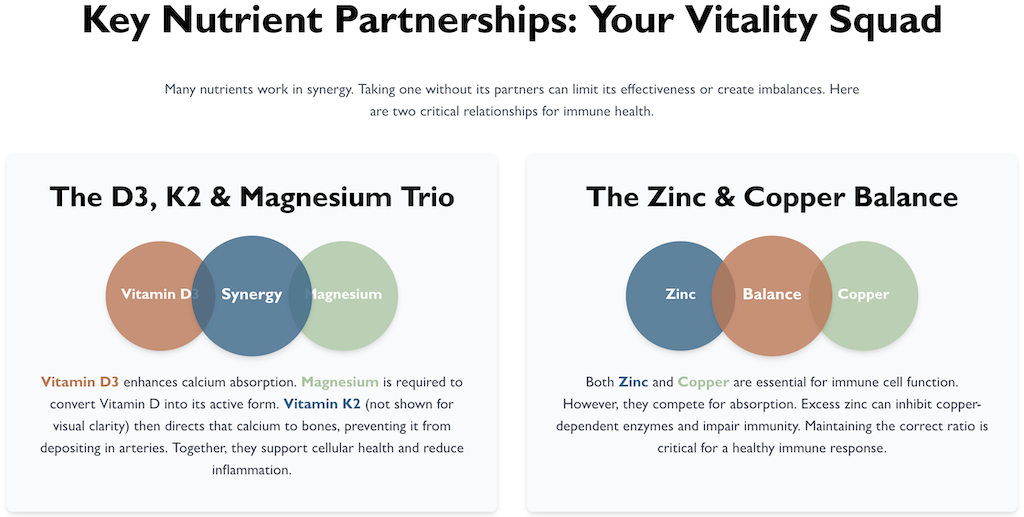
Why Five Journeys?
At Five Journeys, we are committed to providing you with carefully selected organic immune support solutions and personalized guidance for your well-being.
Practitioner-Curated Products
Our selections of immune support supplements are chosen by experienced practitioners, reflecting a deep understanding of immune science and clinical application.
Clean, Clinically-Effective Formulas
We prioritize clean, effective formulas that are free from unnecessary additives and are designed to work in harmony with your body.
Built by Experts Who Care
Our team of experts is dedicated to your health journey, providing a truly holistic approach to immune support.
References
Aaseth, J. O., Finnes, T. E., Askim, M., & Alexander, J. (2024). The Importance of Vitamin K and the Combination of Vitamins K and D for Calcium Metabolism and Bone Health: A Review. Nutrients, 16(15), 2420. https://doi.org/10.3390/nu16152420
Aranow, C. (2011). Vitamin D and the Immune System. Journal of Investigative Medicine : The Official Publication of the American Federation for Clinical Research, 59(6), 881. https://doi.org/10.231/JIM.0b013e31821b8755
Arreola, R., Quintero-Fabián, S., López-Roa, R. I., Flores-Gutiérrez, E. O., Reyes-Grajeda, J. P., Carrera-Quintanar, L., & Ortuño-Sahagún, D. (2015). Immunomodulation and Anti-Inflammatory Effects of Garlic Compounds. Journal of Immunology Research, 2015, 401630. https://doi.org/10.1155/2015/401630
Cancer Research Institute. (n.d.). Immunomodulators. Retrieved from https://www.cancerresearch.org/immunotherapy-by-treatment-types/immunomodulators
Carr, A. C., & Maggini, S. (2017). Vitamin C and Immune Function. Nutrients, 9(11), 1211. https://doi.org/10.3390/nu9111211
Carr, A. C. (2025). Do Liposomal Vitamin C Formulations Have Improved Bioavailability? A Scoping Review Identifying Future Research Directions. Basic & Clinical Pharmacology & Toxicology, 137(1), e70067. https://doi.org/10.1111/bcpt.70067
Cerullo, G., Negro, M., Parimbelli, M., Pecoraro, M., Perna, S., Liguori, G., Rondanelli, M., & Cena, H. (2020). The Long History of Vitamin C: From Prevention of the Common Cold to Potential Aid in the Treatment of COVID-19. Frontiers in Immunology, 11, 574029. https://doi.org/10.3389/fimmu.2020.574029
Djoko, K. Y., Ong, Y., Walker, M. J., & McEwan, A. G. (2015). The Role of Copper and Zinc Toxicity in Innate Immune Defense against Bacterial Pathogens. The Journal of Biological Chemistry, 290(31), 18954. https://doi.org/10.1074/jbc.R115.647099
Fiorentini, D., Cappadone, C., Farruggia, G., & Prata, C. (2021). Magnesium: Biochemistry, Nutrition, Detection, and Social Impact of Diseases Linked to Its Deficiency. Nutrients, 13(4), 1136. https://doi.org/10.3390/nu13041136
Li, Y., Yao, J., Han, C., Yang, J., Chaudhry, M. T., Wang, S., Liu, H., & Yin, Y. (2016). Quercetin, Inflammation and Immunity. Nutrients, 8(3), 167. https://doi.org/10.3390/nu8030167
McGarry, S. V., Cruickshank, D., Iloba, I., & Jensen, G. S. (2024). Enhanced Bioavailability and Immune Benefits of Liposome-Encapsulated Vitamin C: A Combination of the Effects of Ascorbic Acid and Phospholipid Membranes. Nutraceuticals, 4(4), 626-642. https://doi.org/10.3390/nutraceuticals4040034
Pilz, S., Tomaschitz, A., Grübler, M. R., & Verheyen, N. (2017). The Synergistic Interplay between Vitamins D and K for Bone and Cardiovascular Health: A Narrative Review. International Journal of Endocrinology, 2017, 7454376. https://doi.org/10.1155/2017/7454376
Schön, C., Mödinger, Y., Krüger, F., Doebis, C., Pischel, I., & Bonnländer, B. (2021). A new high-quality elderberry plant extract exerts antiviral and immunomodulatory effects in vitro and ex vivo. Food and Agricultural Immunology, 32(1), 650–662. https://doi.org/10.1080/09540105.2021.1978941
Tavakkoli, A., Mahdian, V., Razavi, B. M., & Hosseinzadeh, H. (2017). Review on Clinical Trials of Black Seed (Nigella sativa ) and Its Active Constituent, Thymoquinone. Journal of Pharmacopuncture, 20(3), 179. https://doi.org/10.3831/KPI.2017.20.021
Vik, H. (2019). Highlighting The Substantial Body Of Evidence Confirming The Importance Of Vitamin K2 As A Cardio-Support Nutrient, And How The Right K2 Makes All The Difference. Integrative Medicine: A Clinician’s Journal, 18(6), 24. https://pmc.ncbi.nlm.nih.gov/articles/PMC7238900/

